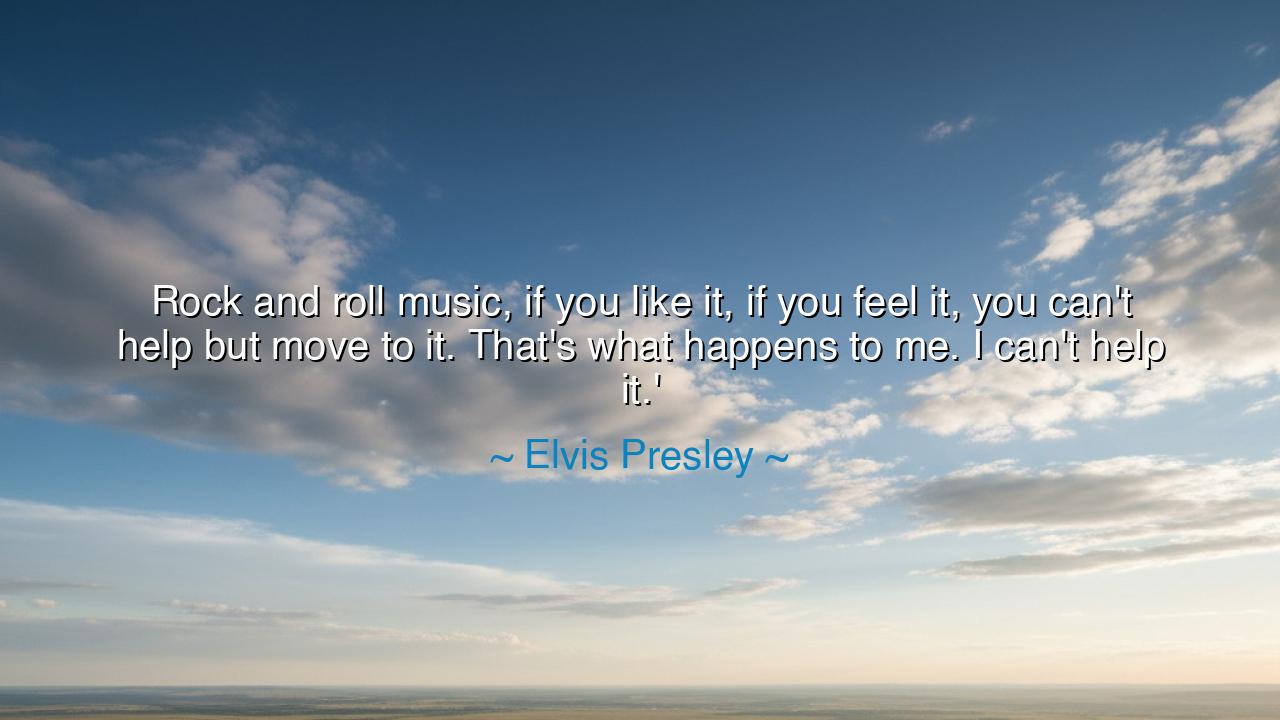
Rock and roll music, if you like it, if you feel it, you can't
Rock and roll music, if you like it, if you feel it, you can't help but move to it. That's what happens to me. I can't help it.'






Hear the words of Elvis Presley, the herald of a new sound, who declared: “Rock and roll music, if you like it, if you feel it, you can't help but move to it. That's what happens to me. I can't help it.” In this confession lies not only the secret of his own power, but the eternal truth of all great art: that true music is not merely heard by the ears, but felt in the body, seized in the spirit, and made flesh in movement.
When Elvis speaks of liking and feeling rock and roll, he reveals that its force is not a matter of intellect or theory. It is primal, immediate, visceral. This music was born of rhythm and struggle, of gospel and blues, of the cries of the oppressed mingled with the joy of survival. To feel it is to surrender to a current that is larger than oneself. And when the current seizes you, you move—not by decision, but by compulsion. Thus, Elvis says he cannot help it. The body becomes the instrument of the soul’s delight.
The power of movement in music has been known since ancient times. The Greeks spoke of the dithyrambs, hymns to Dionysus, where men danced in frenzy, unable to remain still as the music possessed them. In Africa, drumming circles shook the earth, summoning feet and hands to motion, binding communities together through rhythm. Elvis’s words are but the modern echo of this eternal truth: that when music is true, it is irresistible. It does not merely play outside of us; it awakens the music already within.
Consider the story of the birth of rock and roll itself. In the mid-twentieth century, when America was divided by lines of race and tradition, this new music rose from the union of blues, gospel, and country. It was raw, it was shocking, it was alive. When Elvis sang it, when he moved to it, audiences could not remain still. Some cheered, some feared, but all felt the power. It was not only Elvis’s voice, but the authentic surrender of his body to the rhythm that made him an icon. His movements were not planned—they were the visible truth of what the music did to him.
In this, his words also carry a lesson in authenticity. Elvis did not dance because it was expected, nor move because it was choreographed. He moved because he could not resist. This honesty of response—unguarded, unashamed—was what electrified the world. Here lies the teaching: when you are true to what moves you, others will be moved as well. To suppress such truth is to silence your own flame; to express it is to ignite the fire of others.
O children of tomorrow, take this wisdom: let the things that stir your soul be seen in your life. Do not fear to move, to act, to respond with passion when something grips you deeply. Whether it is music, a cause, a vision, or a calling—if it makes your heart beat faster, let it show in your steps. For it is in this visible surrender that your authenticity will awaken others.
Let your practice be this: seek out what you not only hear, but feel. Surround yourself with songs, with work, with people that make you move in spirit. And when you find them, do not hold back. Live with the same abandon that Elvis described, unable to help but be transformed by the force within. For it is in such surrender that joy, inspiration, and greatness are born.
So remember always the words of Elvis Presley: when the music is true, you cannot help but move. Do not resist the rhythms of your own life. Let them shape you, carry you, and set you aflame. In this way, your life itself will become like rock and roll—raw, real, and forever alive.






AAdministratorAdministrator
Welcome, honored guests. Please leave a comment, we will respond soon